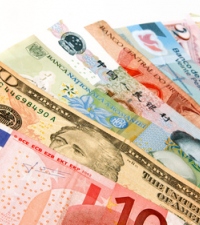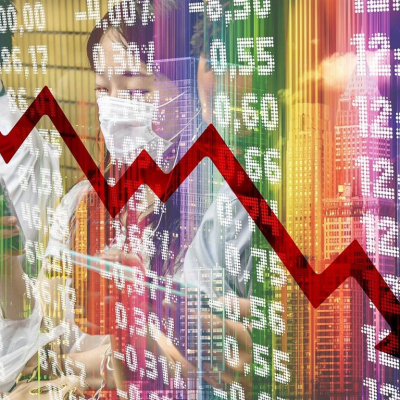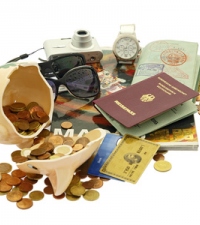How to Get the Best Exchange Rates

Are you an expat, or planning to expatriate? Do you perhaps own a foreign property? Then one of the challenges involved in living abroad with which you may already be familiar is transferring money abroad. If you want to pay for your foreign mortgage with funds from back home, for instance, how do you transfer them in the safest manner, and with the best exchange rate?
In part, this is a matter of choosing the correct service (i.e. one which is secure, with which you feel comfortable, and which offers the best rates). It’s also a matter of making your transfer at the right time. What I’d like to do in this article is spell out some tips for you, so that you find yourself in the best possible position when you come to transfer money abroad.
How to choose the Correct Service
1. Make sure it’s properly regulated
When choosing a service to make your foreign currency transfers, the first and most important thing is to ensure they are a properly regulated company. In the UK, this means making sure they’re directly authorised by the Financial Services Authority. If the company is directly authorised, it means they adhere to all legal and regulatory requirements to transfer money abroad.
To find out if a company is directly authorised, you can do one of two things. The first is to call them, where the person you talk to should be able to tell you about the company’s regulatory background and status. The second thing is to check on their website, which should have a page dedicated to their adherence to FSA requirements.
2. Decide whether you’re comfortable with them
Second, it’s important to make sure you feel comfortable with the service you’re talking to before you use them. In most cases you’ll be designated a personal dealer to help you with your transfers. Do you like this person? Do you feel they know what they’re talking about? If not, you may wish to use a different company, or ask to deal with somebody else.
3. Find out who offers the best exchange rates.
Last of all, it’s of course vital to find out who offers the best exchange rates before you exchange currencies. This is because, if you intend to make a large transfer, perhaps to complete on a foreign mortgage, even a small change in the exchange rates can add up to a large difference in your foreign currency total. A change of just 1.0%, for instance, could add up to thousands.
Who provides the best exchange rates then? In most cases, dedicated foreign exchange brokers will offer better rates than generalised services such as banks. This is because brokers are specialised, and so in a better position to take advantage of the exchange rates. In some cases, the rate you’ll receive from a broker will be as high as 4.0% better, so it’s well worth comparing.
How to get the Best Exchange Rates
1. Look at changing currency as far in advance as you can
Once you’ve chosen your preferred service, there’s also the matter of maximising your foreign exchange rate. This is because, just because a dedicated broker offers better rates than a bank for example, the rate you receive depends on what’s happening on the foreign exchange market. So is the pound or dollar up? The euro down? It’s these questions that determine your exchange rate.
So how do you navigate the currency market? Your best bet is to look at exchanging currencies as far in advance as you can. This is because it gives you a big window to find out where the rates are at, what might happen next, and decide your strategy. If you wait until the last minute on the other hand, you’ll have to accept whatever rate is available, regardless of if it’s good or bad.
2. Consider a forward contract
One of the things you can do to maximise your exchange rate is to use what’s called a forward contract. Simply put, this allows you to lock in the present rate, without having to send your money abroad there and then. Instead, you freeze that rate, and then can transfer your money abroad at any time you like in the next two years, at no extra charge.
The great thing about a forward contract then is that it gets you the rate you want, without having to worry about where the rate might go between now and your transfer date. In the meantime, though you’ve locked in that exchange rate, you can still transfer your money where and where you want at your leisure. To find out about setting up a forward contract, just talk to your dealer.
3. Be reasonable about your expectations
In addition, it’s important to be realistic about what you can expect from the exchange rate. If the pound is at 1.25 against the euro, it doesn’t make sense to wait for it to hit 1.40 before transferring your money - because it might never happen. Instead, it makes more sense to first ask what range the currencies are travelling in, and set your expectations based on that.
Last of all, it’s also important not to get greedy. For instance, if you see the pound is gaining one day, and has already beaten a 3-month high; don’t wait for it to keep climbing. Accept the rate as it is there and then, which is in itself advantageous. This is because, if you hold off, all too often the rate starts to fall again before you have time to transfer money, by which time you’ve lost out.
By Peter Lavelle, an economic commentator at foreign exchange Pure FX.
- My Life Abroad -
A selection of expat stories

"A fun compulsive read!"
J. Matcham, Amazon
"I strongly advise people ready to live abroad to read this book!"
Patrice, Amazon

 Global events on real estate markets: are they connected?
Global events on real estate markets: are they connected? How exchange rates can affect how you pay for a property overseas
How exchange rates can affect how you pay for a property overseas What are the Benefits of using a Broker to Manage Regular Overseas Payments?
What are the Benefits of using a Broker to Manage Regular Overseas Payments? Fexco payment solutions
Fexco payment solutions Private Tuition: A Priority Among Expat Families for Their Children
Private Tuition: A Priority Among Expat Families for Their Children The Ultimate Guide: Buying Real Estate as an Expat
The Ultimate Guide: Buying Real Estate as an Expat  Basics to Real Estate Investing for the Long Term
Basics to Real Estate Investing for the Long Term